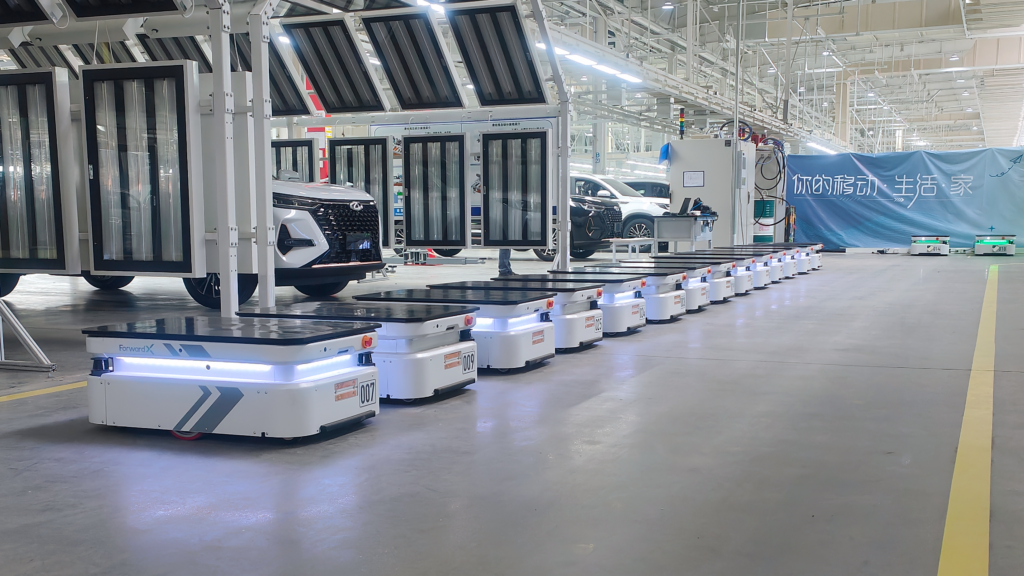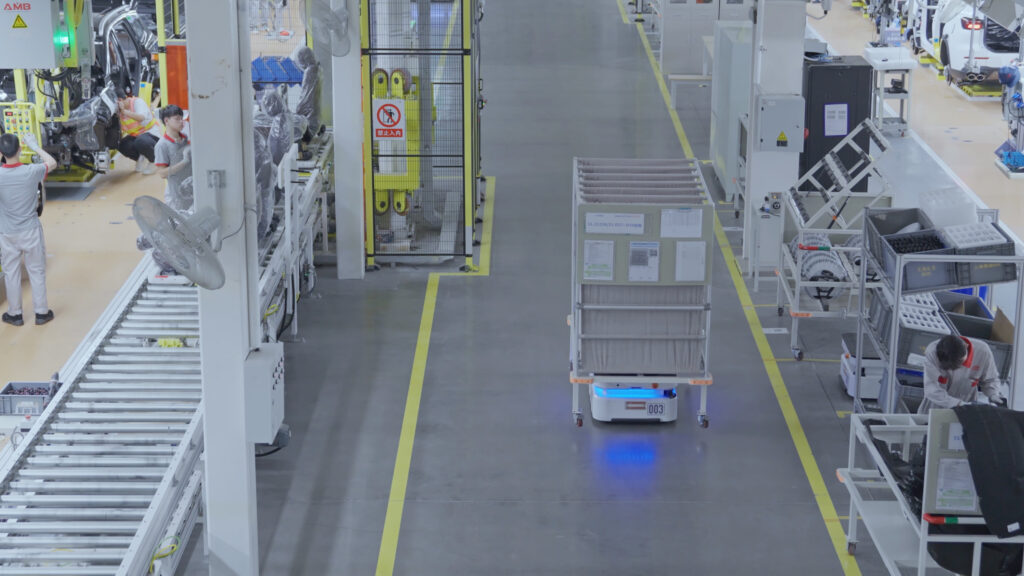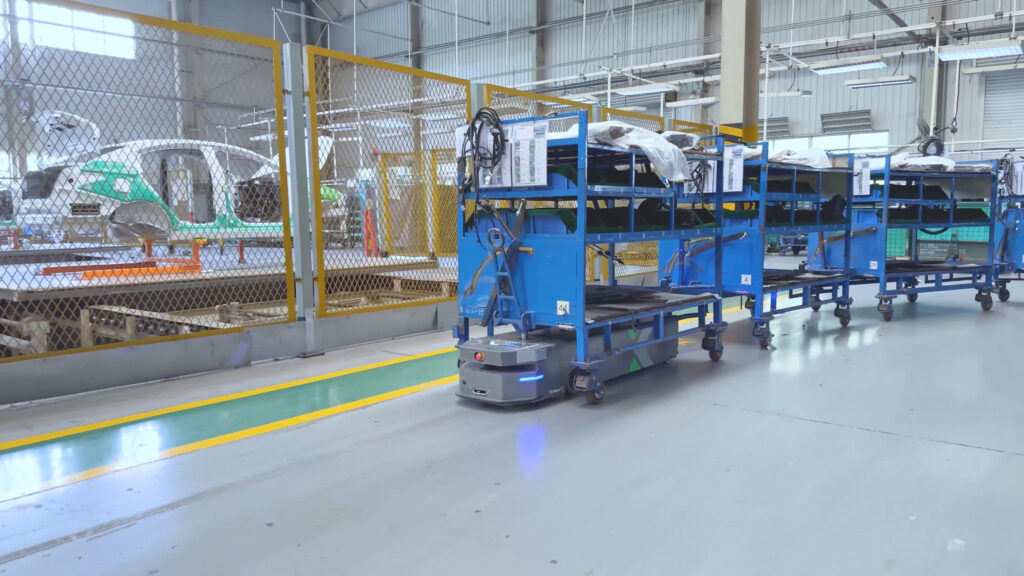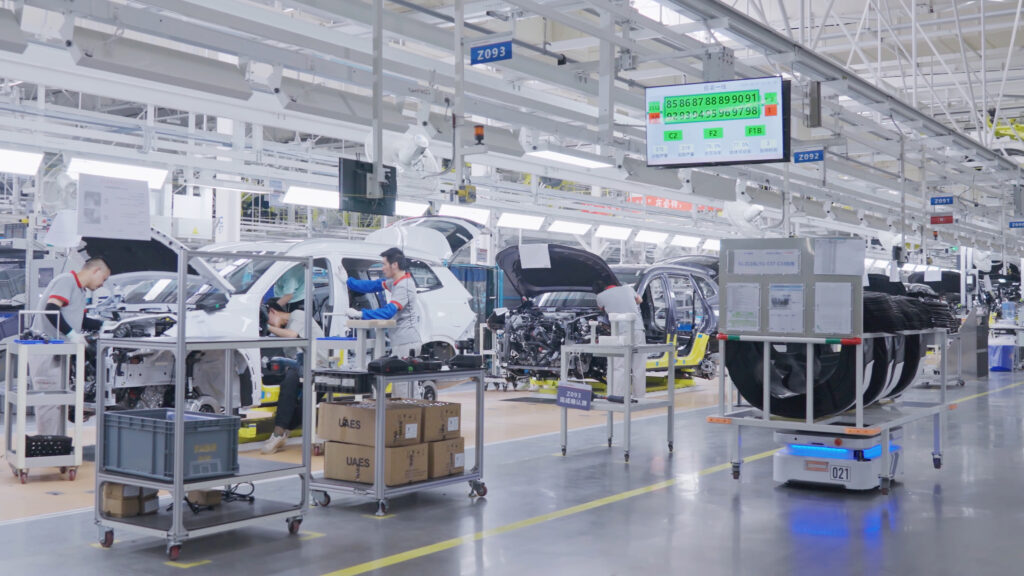The Shift Towards Electric Vehicles
The automotive manufacturing industry has undergone significant transformations in recent years, particularly with the growing emphasis on producing electric vehicles (EVs). Bloomberg New Energy Finance predicts that by 2040, electric vehicles will comprise 57% of all passenger car sales worldwide. As governments worldwide implement stricter emission regulations and offer incentives to encourage EV adoption, the automotive industry is witnessing a profound transformation that will shape the future of mobility.
Change on the Floor
This shift not only aligns with environmental goals but also presents new opportunities for innovation and market growth. From the perspective of assembly and manufacturing plants, the shift towards electric vehicles has several implications.
As more automakers commit to electric fleets and unveil major EV development plans, assembly plants must adapt their processes and equipment to handle the increased complexity of EV manufacturing. Moving from producing internal combustion engine (ICE) vehicles to EVs requires a complete overhaul of assembly processes due to significant differences in design and construction.
Assembly plants may need to invest in new production lines, tools and technology to meet the and industry standards and unique requirements of EVs. Prioritizing agility and efficiency becomes crucial to accommodate the shorter timeline from gathering information to placing products in EVs. Streamlining supply chains and manufacturing processes will be vital to meet accelerated production schedules.
Resilience in manufacturing means being agile, capable of quickly responding to and adapting to change. Assembly plants must be able to adjust swiftly to fluctuations in demand, market conditions, supply lines, and labor availability. With the growing demand for EVs, assembly plants will need to ramp up production, potentially leading to increased hiring and the expansion of manufacturing facilities. Thus, any blueprint for company processes must carefully navigate the ramp-up process to achieve the capacity for manufacturing high-quality products at scale.

Safety Remains Paramount
Automotive manufacturers must adhere to strict safety standards to avoid incurring penalties or facing legal consequences, especially when implementing automation solutions. The need for stringent safety measures in automotive manufacturing arises from multiple compelling reasons.
Working in an industry that relies heavily on heavy machinery, equipment, and materials, automotive manufacturers face significant risks that can jeopardize worker safety if not effectively managed. The presence of AMRs working alongside human workers calls for ensuring the utmost safety. The weight and size of automotive components, such as engines or chassis, necessitate the implementation of strict safety protocols during handling, storage, and assembly processes to prevent potential accidents.
Moreover, the intricacy and high-speed nature of automotive manufacturing operations amplify the importance of implementing stringent safety requirements. Assembly lines and production processes comprise a network of interconnected machines, automation systems, and moving parts. Unplanned downtime caused by malfunctions or safety concerns can have a significant impact on production schedules, leading to delays and financial losses.
By incorporating reliable automation systems, the likelihood of equipment failures is minimized, ensuring consistent uptime. This promotes a smooth production flow, allowing manufacturers to meet their production targets efficiently. Thus, integrating reliable automation solutions equipped with robust safety features becomes crucial to effectively mitigate the associated risks.

ForwardX’s Automotive AMR Solution
Safe & Reliable
ForwardX’s innovative utilization of computer vision + LiDAR multi-sensor fusion navigation AMRs stands out as one of the most advanced and effective technical intralogistics solutions to various pain points in the automotive industry.
The unique capabilities of our AMRs in identifying and classifying obstacles offer significant benefits, especially when it comes to safety in working alongside human workers. The essential foundations for ensuring safety lies within our AMR’s unparalleled environment perception abilities, which plays a pivotal role in safeguarding the manufacturing process. EU CE-MD certified, our AMRs can safely handle and transport diverse materials up to 2500 kg (5511 lbs), helping achieve lean 6 sigma and ensuring JIT delivery. They can autonomously plan alternative routes, avoiding any obstructions that might pose a risk in complex, dynamic environments. This adaptability helps create a safer working environment by minimizing the potential for human-robot incidents.
With an average uptime of over 99% across customer sites, the application of our robots in automotive manufacturing and assembly lines with their advanced perception and adaptive strategies adds an extra layer of safety without compromising efficiency and productivity.

Flexible & Scalable
Furthermore, the strong vision perception capability is indispensable for optimizing operations in complex environments. It allows the system to efficiently navigate through intricate production lines, avoiding collisions and disruptions while leading to improved production efficiency and increased factory floor efficiency. It eliminates the dependence on magnetic stripes and 2D codes, which are prone to issues such as derailment, lost positioning, and high after-sales and maintenance costs. Furthermore, it provides greater adaptability to changes in the production line and enables rapid deployment along with standardized 5S management.
Our system effortlessly accommodates the integration of AMRs, allowing for seamless automation expansion. This scalability feature empowers businesses to effortlessly enhance their operational efficiency by conveniently increasing the number of robots deployed, adapting to changing demands with ease.
One Stop Solution
ForwardX offers End-to-end AMR transport management, including material storage, picking, delivery, and production line integration. Our f(x) Fleet manager can facilitate up to thousands of AMRs per site, seamlessly integrating a wide variety of AMRs, including bilateral tugging AMRs, omnidirectional AMRs and our autonomous forklifts.
Additionally, our solution can seamlessly integrate with the factory’s ERP, MES, WME software, allowing for real-time collection and feedback of logistics and production data. This digital management of the factory provides a foundation for efficiency improvements through the use of digital twin technology, enabling the digitization of material processes and facilitate the digital transformation of smart factories.
By investing in dependable automation solutions, automotive manufacturers can reduce the risks associated with accidents, production interruptions, and financial liabilities, resulting in cost savings over the long term.

Chery Case Study:
Chery Super Factory, a state-of-the-art global automobile manufacturing plant, partnered with ForwardX Robotics to implement a groundbreaking smart automotive manufacturing solution. With an annual production capacity of 300,000 vehicles and 200,000 KD units, the collaboration aims to streamline operations, improve efficiency, and enhance automation in the assembly workshop of the factory.
Since implementing ForwardX Robotics’ smart auto motive manufacturing solution, The Chery Super one factory has successfully lowered the logistics cost per vehicle by an impressive 10%. Moreover, our system keeps the line-side over-supply rate below 15% and the assembly error rate below 0.002% per-thousand vehicles while creating a 200% increase in material preperation efficiency.
The solution covers the post-installation line, ForwardX’s Flex 300-L AMRs transport materials from the staging area to designated workstations after barcode verification.
In the interior line and door line processes, ForwadX’s Lynx U1000 autonomous tugger AMRs transport materials from the staging area to the line-side workstations.
In the chassis line process, Chery Super Factory prioritizes sustainability by reusing old racks and employing ForwardX’s Apex 2000 autonomous forklifts.
If you’re aiming to drive productivity and efficiency in your warehouse or manufacturing facility, regardless of its size, ForwardX Robotics offers cutting-edge AMR solutions that can revolutionize your operations. Experience the transformative power of automated material handling technology and unleash a whole new realm of possibilities for your business.
Contact us to learn how we can help you enhance your operational efficiency while significantly reducing costs.


